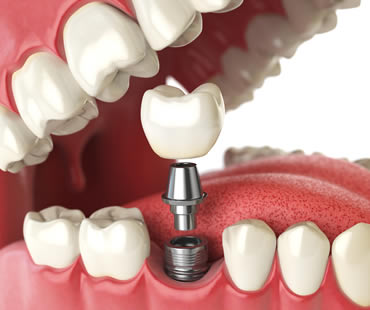
by Dr. Adkins | Mar 24, 2023 | Blog, Dental Topics 2, Implant Dentistry
Most people will eventually lose one or more teeth. Even with vigilant oral care, accident or injury can cause the loss of a tooth. As we age, simple daily wear can cause damage to your teeth resulting in tooth loss. More commonly, periodontal disease or tooth decay will cause you to lose one or more teeth.
While you may think one missing tooth, especially one that does not actually show, is not a problem, most dentists recommend immediately replacing a missing tooth. Missing teeth are not only unappealing aesthetically, but also cause problems with your bite and speech. More critically, missing teeth can cause a chain reaction that results in more missing teeth. Because teeth shift to fill the space created by the missing tooth, those teeth become loose and may eventually fall out.
Another problem caused by missing teeth is jaw bone loss. The pressure of tooth roots into the bone cells keeps them from dissolving. If the root is missing, the bone cells die and the bone disintegrates. The loss of jaw bone results in facial collapse, giving you a caved in and much older appearance. Bone loss also causes remaining teeth to become loose and fall out.
One of the best options for replacing lost teeth are dental implants. The placement of dental implants and tooth restorations can prevent the bone loss that results from missing teeth. Not only do dental implants restore the look of your natural teeth, they also provide the function and feel of your original teeth. Dental implants allow you to return to eating and speaking normally, and return your smile to its natural glory. To find out if dental implants are a viable solution to your missing teeth, contact your dentist for an examination and evaluation. With dental implants you can restore the look, feel and function of your natural smile.
We treat patients from McDonough and the surrounding area

by Dr. Adkins | Feb 24, 2023 | Blog, Dental Topics 2, Implant Dentistry
Dental implants are used to replace individual or missing teeth or to anchor loose dentures. For many patients with these issues, traditional dental implants may not a viable option. For example, a patient who does not possess adequate bone levels to anchor the implants would not be a good candidate for traditional dental implants. With mini dental implants, the bone required to anchor the implant successfully is much less.
Thanks to advances in implant dentistry, these patients have other options. Mini dental implants have emerged as an attractive choice for cases that are not conducive to the placement of traditional implants. For the patient who has inadequate bone, the bone required to successfully anchor mini dental implants is much less. Unlike traditional implants, the placement procedure for mini dental implants is a minimally invasive procedure that can be completed in one appointment by a specially trained general or family dentist. Because the procedure is less involved, the pain and length of recovery is greatly diminished.
Patients who have existing health conditions that would preclude them from more invasive surgery may find mini dental implants an extremely appealing option. Mini implants are also a perfect choice for restoring one missing or damaged tooth. Should implant failure occur, grafting procedures would not be necessary because of the small size with mini dental implants.
Most importantly, mini dental implants maintain the look, feel and function of your natural teeth. While you have to wait months for traditional implants to fuse with the bone, mini dental implants are ready for immediate use. Talk to your dentist to determine if mini dental implants would be a good option for your dental restorations and get ready to face the world with a confident new smile.
If you need a dentist in McDonough contact us today

by Dr. Adkins | Feb 17, 2023 | Blog, Dental Topics 1, Implant Dentistry
Preserving the bone in your jaw and face is of utmost importance to your cosmetic dentist, and as such, treatments that preserve bone are preferred over those that lead to bone shrinkage, known as resorption.
Dental implants preserve bone by mimicking the tooth’s natural roots, stimulating and preserving the bone. As part of the healing process following surgical placement, the jawbone fuses directly to the implant. Most often made of titanium, dental implants provide a very stable foundation for a replacement tooth. This foundation is so stable that it can serve as an anchor point for dental bridgework and will feel, look, and function as your natural tooth would.
The process of implant to bone fusion is known as “osseointegration.” Fusion is primarily dependent upon the quality of bone surrounding the implant, and can be achieved in three to nine months following dental implant treatment. Excessive smoking or drinking can stunt the healing process and lead to complications.
Because bone resorption is prevented with dental implants, your facial structure will not collapse and your facial shape will not change. Missing teeth that are replaced by implants avoid other problems commonly associated with tooth loss, including other teeth shifting into the open spaces created by the missing teeth, and functional problems with the jaw joints and bite alignment.
Once a tooth is extracted or falls out, a great deal of the bone in the area will shrink, or resorb over the coming year. Shrinkage occurs in a horizontal as well as vertical dimension. Most resorption occurs within the first two to three months following tooth loss. When a cosmetic dentist replaces that tooth immediately with a titanium dental implant, the bone fuses around the implant, significantly reducing bone shrinkage.
Dental implants are the only restorative treatment that preserves and maintains bone. Dentures and partial dentures can accelerate the process of bone shrinkage as a result of pressure on the underlying mouth structures as you talk or eat.
We look forward to seeing you in our McDonough dental office

by Dr. Adkins | Jan 27, 2023 | Blog, Dental Topics 1, Implant Dentistry
Losing teeth for one reason or another is not as uncommon as you might think. Injuries and severe tooth decay are only a couple of the causes for smiles to have holes in them from missing teeth. The good news is that you don’t have to go through life with an incomplete smile. Dental implants provide one solution for replacing lost teeth.
Popularity
These restorations that involve a titanium root with an artificial tooth on top have become increasingly popular. Instead of using bridges or dentures that are known to have some hassles with them, implants are a permanent and secure solution. Once the area has healed, you can go back to your normal habits without any concerns related to the implant. They look very natural, preserve neighboring teeth, improve speech, restore the mouth’s function, and help maintain your facial features.
Candidates
Good candidates for implants have strong enough jaw bones to be able to support the implant. Patients with significant bone loss may not be able to successfully maintain implants. Good oral health is helpful, as is good general health since surgery is required. Smokers and those with certain health conditions may not be recommended for dental implants.
Procedure
Once you’ve been identified as a good candidate, the first step is having the titanium rod inserted into your jaw bone. It can take up to three months for it to completely fuse with your bones. Then your dentist will make an abutment to hold the implant, and a mold will be taken of your mouth so that the crown can be created. Until it is ready, a temporary crown will be placed. Finally, your crown will be placed and adjustments will be made if needed.
Maintenance
After you implant is complete, you can resume your regular lifestyle. Your normal dental hygiene routine of brushing, flossing, and checkups should be maintained for the best results.
We offer dental implants at our McDonough dental office.

by Dr. Adkins | Jan 20, 2023 | Blog, Dental Topics 1, Implant Dentistry
Missing teeth can put a damper on your active lifestyle. You may feel self-conscious about your appearance, experience limitations in diet, or have difficulty speaking. Without a full set of teeth, you risk gum degeneration, bone loss, and other oral health problems. Designed to mimic the look and feel of natural teeth, dental implants can rejuvenate your smile.
What is a dental implant?
A small titanium post that serves as an artificial tooth root, a dental implant is surgically positioned into your gums. Your dentist will place a permanent crown on each implant, which completes the replacement tooth. Implants can be used for one or more missing teeth.
Am I a candidate for dental implants?
In general, anyone with a missing tooth should consider dental implants. The key to successful implant placement is good oral health and sufficient bone structure to support the posts. If you don’t have adequate bone levels, your dentist may recommend a bone graft to correct that situation.
How long does the procedure take?
Receiving dental implants is a two-step process. During the first visit, a trained specialist will surgically implant the posts into your jawbone. Then, you will need to wait three to six months for healing and integration with the jawbone. Once this occurs, your dentist will place the permanent crowns on the implants, giving you a full smile.
How do I care for my implants?
Just like your natural teeth, your implants require daily care. Brush often and floss frequently. Regular dental checkups are also important, so schedule visits at least twice a year.
Schedule your appointment at our McDonough dental office

by Dr. Adkins | Jan 6, 2023 | Blog, Dental Topics 2, Implant Dentistry
Some patients wonder if dental implants are the best choice for their missing teeth. The time and effort dental implants take can be off-putting to some patients. If you’re wondering if dental implants are really worth it, there are many factors for you to consider.
Dental implant treatment takes a relatively long period of time to complete as well as to completely heal when compared to other tooth replacement options, such as a bridge. The planning process is far more involved than in other missing tooth replacement plans. The materials utilized with dental implants take more time to create in a dental lab and require greater skill and attention than other lab-created tooth replacements.
Dental implants are much stronger than other tooth replacement options, and will last years or even decades longer. When compared to a dental bridge which lasts an average of 14 years, a dental implant can last up to 30 years.
Sometimes, if insufficient bone is present to provide the necessary support for the implant, bone from elsewhere in the body might be grafted onto the existing bone. A dental implant must heal completely before any pressure is put on the new artificial tooth roots. This can take up to three months. After this time, the tooth portion of the dental implant is applied.
Dental implants are the strongest, best choice for a patient with a missing tooth. They rarely fracture and never decay. As opposed to a dental bridge that necessitates the removal of some of your natural tooth structure, a dental implant preserves adjacent teeth and allows patients the most natural, ideal choice for tooth replacement.
Dental implant candidates who are willing to be patient and plan for the future can experience the benefits these restorations have to offer. Talk to your dentist if you want to explore your options for replacing one or more missing teeth.
We treat patients from McDonough and the surrounding area








 770-957-5214
770-957-5214  E-Mail Us
E-Mail Us 
